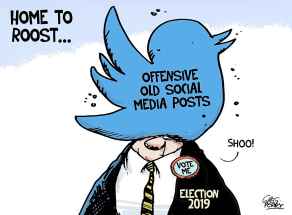Misapplication of election-blackout rules continues
Read this article for free:
or
Already have an account? Log in here »
To continue reading, please subscribe:
Monthly Digital Subscription
$0 for the first 4 weeks*
- Enjoy unlimited reading on winnipegfreepress.com
- Read the E-Edition, our digital replica newspaper
- Access News Break, our award-winning app
- Play interactive puzzles
*No charge for 4 weeks then price increases to the regular rate of $19.00 plus GST every four weeks. Offer available to new and qualified returning subscribers only. Cancel any time.
Monthly Digital Subscription
$4.75/week*
- Enjoy unlimited reading on winnipegfreepress.com
- Read the E-Edition, our digital replica newspaper
- Access News Break, our award-winning app
- Play interactive puzzles
*Billed as $19 plus GST every four weeks. Cancel any time.
To continue reading, please subscribe:
Add Free Press access to your Brandon Sun subscription for only an additional
$1 for the first 4 weeks*
*Your next subscription payment will increase by $1.00 and you will be charged $16.99 plus GST for four weeks. After four weeks, your payment will increase to $23.99 plus GST every four weeks.
Read unlimited articles for free today:
or
Already have an account? Log in here »
Hey there, time traveller!
This article was published 18/09/2019 (2275 days ago), so information in it may no longer be current.
The decision by Manitoba’s police watchdog to withhold information about multiple investigations it opened during the summer months is another example of why the province needs to amend its pre-election blackout rules on government communication.
The Independent Investigation Unit disclosed Monday that it launched 13 investigations between June 12 and Sept. 10 into allegations of criminal wrongdoing by police officers.
The IIU normally informs the public when it begins an investigation. But a spokesperson for the agency told the Free Press this week the province’s pre-election blackout rules prevented it from doing so in these cases.

This is clearly not the intent of the legislation.
Under the Election Financing Act, government departments and Crown agencies “must not advertise or publish any information about… programs or activities” during an election period, or in the 90 days before a fixed-date election.
(The 90-day rule applied informally this election even though an early election was called.)
The wording in the act is ambiguous and has caused endless confusion among department heads and Crown agencies over the years. There are exemptions in the act that allow government to solicit tenders, publish information related to matters of public health or safety or, in the case of a Crown agency, information that is a “continuation of earlier publications or advertisements and is required at that time for ongoing programs of the agency.”
But beyond that, legal officials in government have interpreted the act to mean a blanket ban on the publication of any information or advertisement by government or a Crown agency. That needs to be changed. It’s preventing agencies such as the IIU and others from releasing information of public importance that has nothing to do with the intent of the blackout rules.
Banning governments from making feel-good, pre-election announcements– particularly ones involving taxpayer dollars — is a laudable goal and an important ingredient in running fair elections. But the wording in the legislation is flawed. Its broad language and limited exemptions are causing unintended outcomes, not just for the IIU but for other agencies, as well.
The reason the province brought in pre-election blackouts was to prevent governments from gaining an unfair advantage in the lead-up to, and during, election campaigns. Banning governments from making feel-good, pre-election announcements — particularly ones involving taxpayer dollars — is a laudable goal and an important ingredient in running fair elections.
But the wording in the legislation is flawed. Its broad language and limited exemptions are causing unintended outcomes, not just for the IIU but for other agencies, as well.
During this past election, the Winnipeg Regional Health Authority said it was prevented from publishing its online monthly emergency room wait-time statistics due to the blackout. It ended up releasing the data to reporters over the phone during the campaign, after Premier Brian Pallister said publicly he thought the data should be released.
The confusion and lack of consistency in the application of the law — not to mention the apparent political interference by a premier during an election — underscores the need to clarify the legislation.
Even the Manitoba Bureau of Statistics — which regularly publishes population, economic and other data on its website — refused to release any statistical updates during the election, citing the blackout rule.
Agencies such as the IIU, WRHA and MBS should be able to publish information of public importance during elections and leading up to writ periods, when that information doesn’t interfere with the fairness of a campaign.
The wording in the Election Financing Act should be amended to reflect that.








